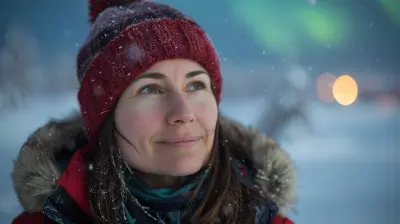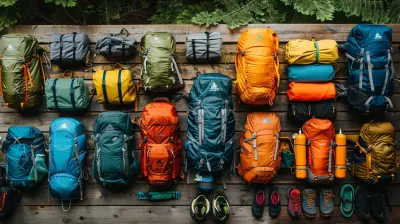How to Handle Allergies While Traveling
29 June 2025
Traveling is an exciting adventure, but for those with allergies, it can also be a bit nerve-wracking. Whether it's food allergies, seasonal allergies, or pet dander sensitivities, being away from home adds a layer of unpredictability. But don’t let that hold you back! With the right preparation and mindset, you can enjoy your trip without sneezing through sightseeing or worrying about an allergic reaction.
In this guide, we’ll cover everything you need to know about handling allergies while traveling, from planning ahead to in-the-moment solutions. Let's dive in! 
1. Plan Ahead: The Key to a Stress-Free Trip
If you have allergies, preparation isn’t just helpful—it’s essential. A little extra planning before your trip can save you from unpleasant surprises.Check the Allergy Situation at Your Destination
Before booking your trip, research your destination’s allergy risks. If you have seasonal allergies, check pollen forecasts to see if trees or flowers will be in full bloom. For food allergies, research local cuisine to see if common ingredients might be problematic.Book Allergy-Friendly Accommodations
Not all hotels and vacation rentals are created equal when it comes to allergies. Here’s what to look for:- Pet-free hotels: If you're allergic to pet dander, choose accommodations that don’t allow pets.
- Hypoallergenic rooms: Some hotels offer rooms with air purifiers, fragrance-free products, and allergen-free bedding.
- Non-smoking rooms: Even if smoking isn’t allowed indoors, some places have lingering smoke odors that can trigger allergies.
Pack Your Allergy Essentials
Your suitcase should be your allergy survival kit. Be sure to pack:- Antihistamines (both daily and fast-acting for emergencies)
- Epinephrine auto-injector (EpiPen) if you have severe allergies
- Allergy-friendly snacks in case safe food is hard to find
- Saline spray to rinse out allergens from your sinuses
- Face masks (especially helpful for pollen season or dusty environments)
- Wet wipes to clean surfaces before touching them 
2. Food Allergies: Eat Without Fear
Food allergies can be one of the trickiest challenges when traveling, but with some smart strategies, you can enjoy local cuisine without stress.Carry a Food Allergy Card
A food allergy card, written in both English and the local language, can help restaurant staff understand your dietary needs. It should clearly list what you cannot eat and the severity of your allergy.Choose Safe Dining Options
- Stick to simple dishes with fewer ingredients to reduce the risk of hidden allergens.- Call ahead and ask if the restaurant can accommodate allergies.
- Watch out for cross-contamination, especially with shared cooking surfaces.
Be Cautious With Street Food
That sizzling street food might smell amazing, but be extra cautious. Vendors may not always understand cross-contamination risks, and ingredients may not be clearly listed. If in doubt, skip it.
3. Stay Comfortable During Seasonal Allergies
If pollen is your nemesis, traveling during allergy season can feel like an uphill battle. But don’t worry—there are ways to keep symptoms at bay.Check Pollen Levels Daily
Apps like Weather.com and Pollen.com can tell you how bad the pollen levels are for the day, helping you decide if you need extra precautions.Time Your Outdoor Activities
- Early mornings and late evenings tend to have lower pollen counts.- Avoid windy days since they stir up allergens and make symptoms worse.
Protect Yourself from Pollen
- Wear sunglasses to keep pollen out of your eyes.- Shower and change clothes after spending time outdoors.
- Keep windows closed in your hotel or car to limit pollen exposure.

4. Air Travel with Allergies
Airplanes can be challenging for allergy sufferers due to recycled air, pet dander, and food allergens. Here’s how to make your flight smoother.Notify the Airline in Advance
Many airlines accommodate allergies if you give them a heads-up. For food allergies, you can request a special meal—or better yet, bring your own snacks to be safe.Wipe Down Your Seat and Tray Table
Airplane surfaces can be a hotspot for allergens. Use disinfecting wipes to clean your seat, armrests, and tray table before settling in.Use a Face Mask
Filtering masks can help reduce exposure to airborne allergens—especially helpful if you're sitting near someone with a pet or if you're sensitive to strong scents.5. Dealing with Allergic Reactions While Traveling
Even with the best planning, unexpected allergic reactions can still happen. Being prepared can make all the difference.Know the Nearest Medical Facilities
Before you go, look up nearby hospitals and pharmacies at your destination. Having this info on hand can save time in an emergency.Travel with an Epinephrine Auto-Injector
If you have severe allergies, carry at least two EpiPens and make sure your travel companions know how to use them.Have an Emergency Plan
- Tell your travel buddies about your allergies and what to do if you have a reaction.- Keep emergency contact info in your phone and on a card in your wallet.
6. Choose the Right Transportation
Whether you're taking a plane, train, or car, transportation can expose you to allergens. Here’s how to minimize risks:Car Travel
- If you're renting a car, ask for one that hasn’t had pets or smokers inside.- Use air conditioning instead of rolling down windows to keep pollen out.
Train or Bus Travel
- Pick a seat away from doors to reduce exposure to outdoor allergens.- Carry hand sanitizer and wipes to clean shared surfaces.
Final Thoughts: Allergies Don’t Have to Hold You Back
Traveling with allergies may require some extra steps, but with the right precautions, you can have an amazing and worry-free trip. The key is being proactive—knowing your triggers, carrying the right medications, and staying informed about your destination.So, go ahead and book that trip! With a little planning, you’ll be ready to take on the world—allergy-free.
all images in this post were generated using AI tools
Category:
Travel HealthAuthor:

Shane Monroe
Discussion
rate this article
2 comments
Zeal Nelson
Thank you for this incredibly helpful article! Navigating allergies while traveling can be challenging, but your tips make it so much easier. It’s reassuring to know there are practical steps we can take to enjoy our adventures worry-free. Happy travels to everyone, and stay healthy!
October 28, 2025 at 5:01 PM

Shane Monroe
Thank you for your kind words! I'm glad you found the tips helpful. Wishing you worry-free travels and good health!
Sybil McPhee
This article provides valuable insights on managing allergies while traveling. It strikes a good balance between practical tips and personal anecdotes, making it relatable and informative for travelers seeking to enjoy their journeys with confidence.
July 6, 2025 at 4:53 PM

Shane Monroe
Thank you for your kind words! I'm glad you found the tips and anecdotes helpful for your travels. Safe journeys!


